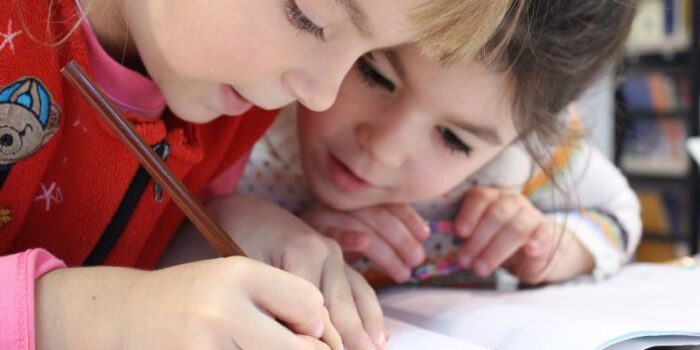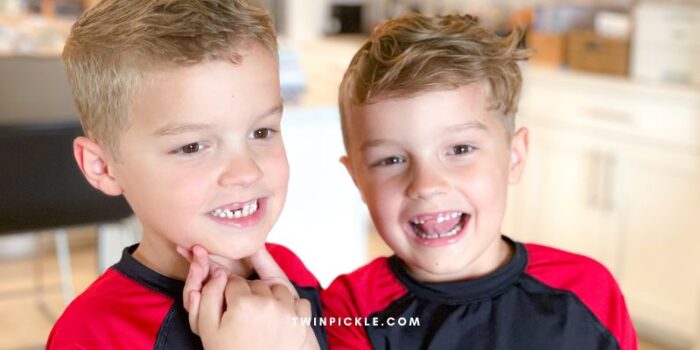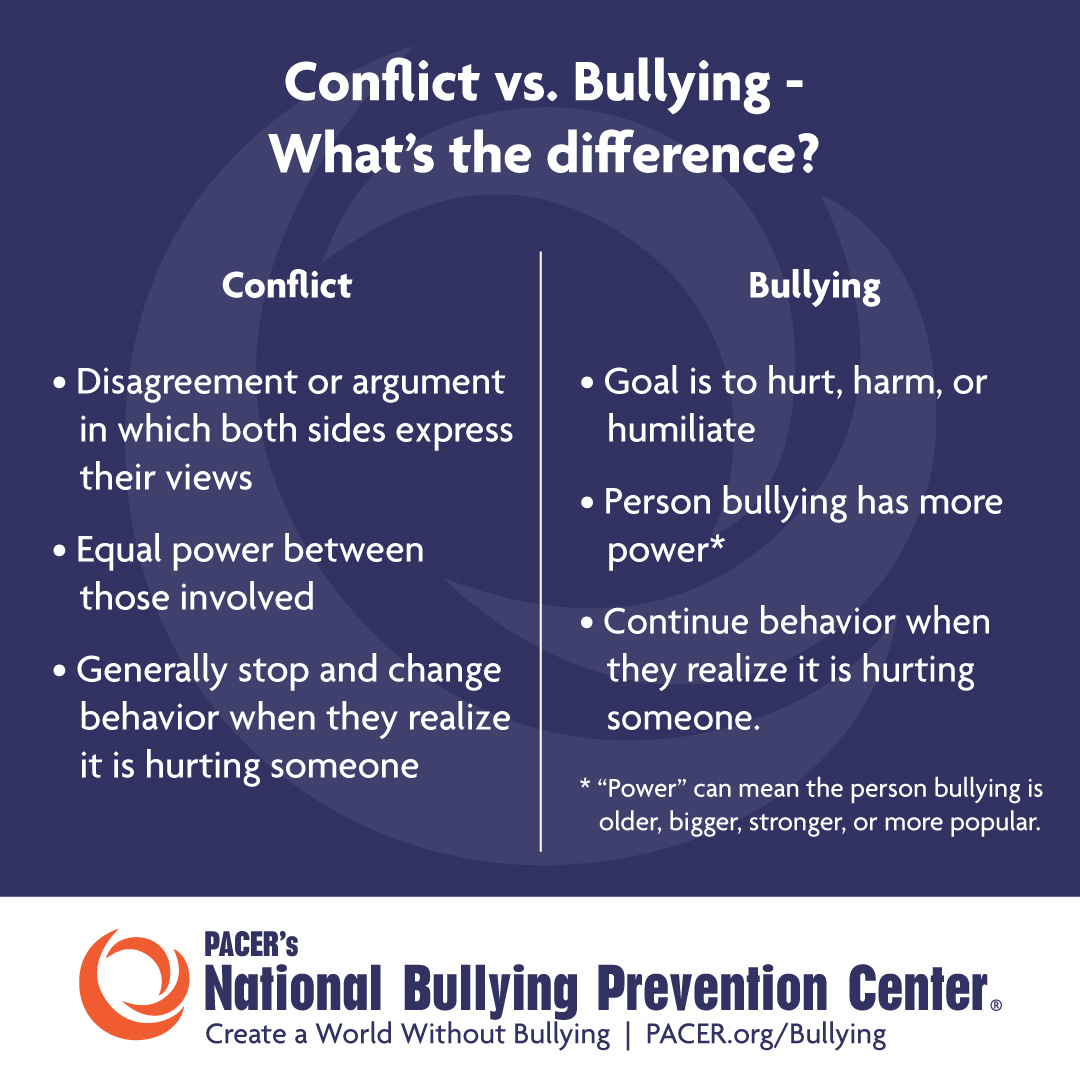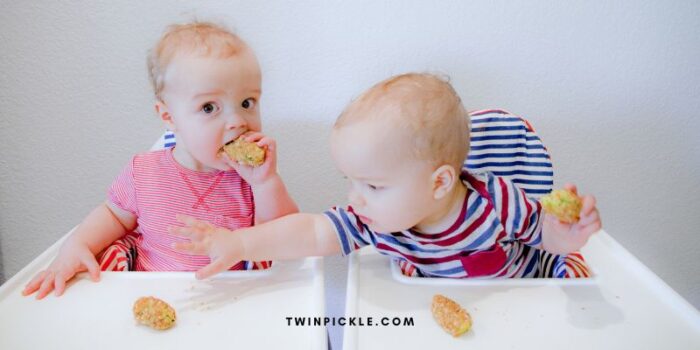Many of us have personal experience with sibling rivalry, but when a parent watches one twin bullying the other it can be particularly difficult to stomach. Twins are known for their eternal bond but does being a twin genetically predispose a sense of hierarchy? Bullying of some form is something many parents of multiples witness, but why, and how do we deal with it?

When my identical boys were 18 months old I wrote an article about dominance and submissiveness in twins. Back then I was wondering where it all came from. How can two young, seemingly identical toddlers, form their own pecking order? Today I offer a more scientific approach and share more about their relationship now they are 7yrs old. Some things have changed and some things will likely be this way forever.
The Effect of Close Companionship
In 2017, Twin Research and Human Genetics published a study to examine the risk of victimization and bullying in twins. The study compared classroom behavior and found that twins were no more likely to bully their classmates, or be bullied, than singleton children. The study also found that twin girls placed in the same classroom were less likely to be bullied by others. It seems the protective effect of having a close companion in class helps with security. Safety in numbers.

Another study looked at social behavior during playtime with peers. Twins and singletons were compared to decide if being a twin affects how prosocial and aggressive you are. The test was carried out on 5-year-olds and later during middle school parents were also interviewed about their kids’ behaviors. Young twins seemed a little less social with peers than singletons but with no more aggression in their behavior. However, when parents were asked, they were more likely to report aggressive behavior than singleton parents. As a mother of twins myself, I suspect this is because most aggressive behavior happens at home. Twins fight when they are playing together, and not with peers during an observed study.
If being born a twin doesn’t make you a bully in general, why is one twin bullying the other so common?
Do Fraternal Twins Bully Each Other More?
To try and assess why twins may bully each other, we first need to understand why bullying happens in general. The is little doubt there is deep love between twin siblings. But natural competitiveness between them can lead to one seeking to gain power and control over the other. However much we say we won’t, it’s extremely difficult not to make comparisons between twins. Who is born first? Crawled first? Who learned their alphabet first?

It is usually fraternal twins that suffer the most from the constant comparison. Genetically, fraternal twins are no more alike than singleton siblings. Yet, growing up on the same timeline makes it easy to notice skills that one twin excels at and one does not. A disparity of such power can easily become the basis for one twin bullying the other.
“Fraternal twins, are particularly competitive and sometimes given to intense jealousy. Their rivalry is intensified because each twin has entirely different potentials and abilities.”
New York Times, Bringing Up Two at Once
Luckily for me, my identical twins are extremely identical. They’ve always been the same weight, took their first steps on the same day, and now as 7-year-olds even lose their baby teeth in amazing synchronicity. Despite their similarities, the competitiveness between them is real, and no doubt feeds into their fallings out. However, I suspect it is not the core reason for bullying between them.

Identical twins are also so equal (their I.Q.’s for instance customarily vary by only five or 10 points), that they can never really be ahead of each other for any significant time. What one can do better today, the other will be able to do as well next week. It seems reasonable to accept the idea that identicals abandon the struggle for supremacy very early as hopeless.
New York Times, Bringing Up Two at Once
Conflict Vs Bullying
Siblings don’t always get along and conflict is inevitable. Dealing with conflict helps us grow and change our opinions, and it’s important that children learn conflict resolution. However, when does conflict become bullying? And how do we identify bullying between twins so we can step in a help?

My 7 yr-old boys fight, sometimes physically, sometimes by shouting at each other. But, they recover from their arguments quickly and resolve their differences with relative maturity. The Twins have become more equal in power over time. They don’t always hear the other’s point, they will change their behavior if they realize they are hurting the other. They have a relationship rife with conflict because they are the best of friends and spend all their time together. This is why we made the decision to separate them in school. It was the best decision for them and I love hearing them share stories on the way home. However, it was not always like this.
Toddler Twin Bullies
When the boys were toddlers, one twin gained power over the other. One boy was constantly being bitten and trampled on, and there was little backing down by the dominant twin. People say ‘Baby A’ (first born) is usually the dominant twin, and for us, this was indeed the case. He gained a little more weight when we started solids foods and this tiny size difference seemed to give him the edge. I would say our dominant twin bullied from 1-3yrs old, and his brother just sucked it up. My husband and I even coined the phrase Twin Stockholm Syndrome because he couldn’t understand why he didn’t stand up for himself.

The Tipping Point
Over time, their size difference evened out, and the twin that used to be the victim started to gain his own power in the form of social skills. He made friends a little easier than his brother in daycare and overall the power struggle started to subside. They still fight occasionally, but there are no longer bite marks and bruises. And they both start the fight as often as the other.
Most of the time I let arguments run their course, and I only really step in if it gets physical. I had to keep a much closer eye on them when they were younger as someone could get seriously harmed. So, what is the best way to manage aggressive behavior between twins?
How Do We Manage One Twin Bullying the Other?
Somedays my kids just can’t get along, and on those occasions, I separate them. Scholastic Parents offer some wise words about sibling bullying and great advice about how to tackle the issue. Ultimately, it’s important to give them space and listen to each of their concerns. Set clear rules about what is expected of them. Children all benefit from understanding the consequences of their actions. Reviewing rules about behavior is important for them to be able to make good choices.

Create Opportunity for Equality
As I mentioned above, our power struggle improved once the ‘weaker’ twin gained power in daycare. He was a better listener and better at sharing, and in turn, kids at daycare generally liked him more. Both twins need to find their own strengths and be able to celebrate them. Be sure to praise the little wins and encourage overall equality.
Encourage Self-Awareness
My dominant twin has a short fuse, and we have really worked on recognizing his emotions. We have taught him to identify when he’s about to lose it. This way he can act with thought instead of lashing out. Those conversations happen when he is calm so he’s not defensive and can have a good think about things. We’ve only been able to do this successfully since he was 5-6yrs old. It takes a certain amount of maturity to understand emotions properly. However, some younger kids are very in touch with their emotions so I think these conversations are worth trying at any age. My boys have both got much better at knowing they need to ‘walk away’. They recognize that pang of anger, self-awareness has helped them greatly.
Acknowledge Their Actions
When a conflict escalates, it is easy to forget or not acknowledge the severity of your actions. With all the grappling, separation, and telling off, the bully convinces themselves they are the victim. After a cool-down period, it is important for the child to relay back what happened. They shouldn’t sugar-coat the consequences of their actions. By verbalizing what happened and how they could have dealt with it differently there is a greater chance of remorse and a genuine apology.
Parenting twins is tough and full of unique challenges. I hope this post gives some hope for improvements over time. We have certainly seen a dispersion of the power divide and overall a better relationship between our twins. May the peace continue.


One response to “One Twin Bullying the Other: The Power Struggle”
Hi Katherine! Great article. I currently have three year old identical twin boys. I am at my wits end on what to do with my twin A bullying his brother during their sleep. What did you do during those toddler years? We had to install a camera in their room that provides us with video playback to see exactly what he was doing. Twin B would tell us his bubba woke him up, but to see how just breaks my heart.